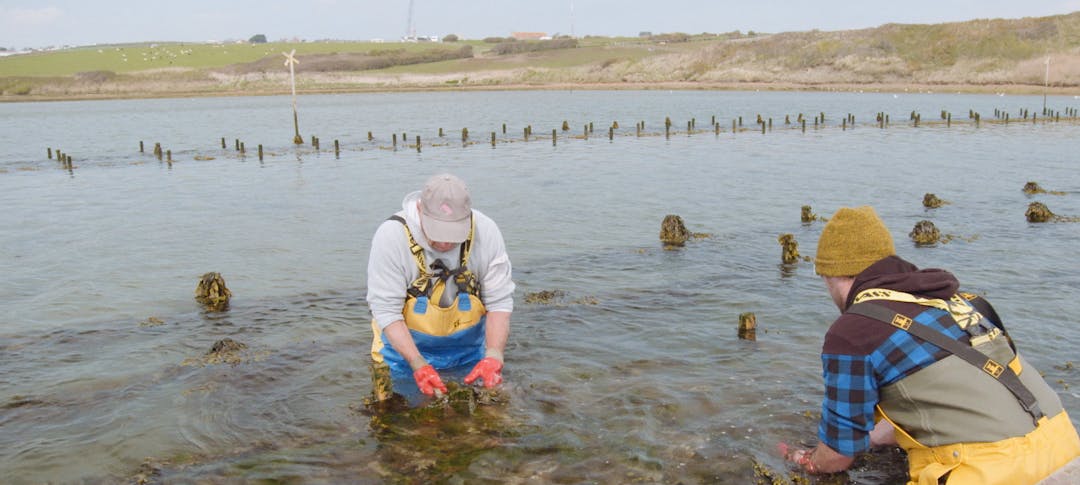English Aquaculture Innovation Hub

Photo credit: Butterfly Effect Films and Crab House Cafe
What has happened so far?
Dorset has a thriving aquaculture sector and has been recognised by the Department for International Trade with the award of a High Potential Opportunity (HPO) for Sustainable Aquaculture. The HPO is supported by the Dorset LEP and Dorset Council with the aquaculture sector being recognised locally as having the ability to provide rural and coastal community jobs across the county.
In November 2020, the Seafood 2040 programme released The English Aquaculture Strategy (EAS). The EAS sets out the ambition to increase aquaculture production ten-fold over the next 20 years, and identifies the development of an English Aquaculture Innovation Hub as being critical to realising this. Additionally, the Dorset Mariculture Strategy (DMS), released in August 2020, identified the need for an Aquaculture Innovation Hub to develop the sector across the county.
Dorset Coast Forum has secured funding from the Marine Management Organisation to further develop the concept of an English Aquaculture Innovation Hub. The five-month project will see:
- New Economics Foundation undertake an in-depth economic review of the English aquaculture sector
- Hatch Accelerator develop a robust business model and plan to enable the long-term operation of the Hub
- 5G Rural Dorset develop a report to understand how 5G technology can enhance the sector as it grows
- Dorset Coast Forum will lead on stakeholder engagement as it is important that the outcomes of these studies meets the needs of local, regional, and national maritime sectors.
Why develop an English Aquaculture Innovation Hub?
Over the last four years significant momentum has been building behind aquaculture across Dorset and England and now the time is right, with stakeholder support, to develop a world leading, innovation hub to take aquaculture production to the next level.
There is a Sustainable Aquaculture Innovation Centre in Scotland which, until recently, has focused largely on the salmon production which dominates the Scottish aquaculture sector. The English coastline is very different to that of Scotland and isn’t really suited to the farming of salmon in the sea, so in the short to medium term the English aquaculture sector is not likely to feature salmon in cages in the sea. It is much more likely that seaweeds and shellfish will be the dominant focus of the English sector, and while these are grown elsewhere in the UK, there is a specific need to develop techniques, cultivation methods and technology that can fit with the unique nature of the English coastline and its existing uses.
Alongside the development of seaweed and shellfish farming techniques the EAS and the DMS both highlight the predicated increase in Recirculating Aquaculture System (RAS) production, where fish and shellfish are grown in tanks on land or in ports. This emerging area of aquaculture production will rely on new technology and energy sources to produce affordable, sustainable seafood grown close to towns and cities, reducing carbon food miles, and helping achieve the UK Government’s targets for Net Zero Emissions and food security.
Next steps for an English Aquaculture Innovation Hub in Dorset
DCF have been engaging with stakeholders, marine users and landowners across England. It is important that we understand their views and needs as the sector grows, to facilitate a mutually beneficial relationship between existing use and new aquaculture business.
Thank you to everyone who completed the online survey (which closed on 22 November 2021). Survey feedback highlighted that 90% of the responses supported an English Aquaculture Innovation Hub and 83% of the responses said that the concept of an English Aquaculture Innovation Hub is relevant to them or their business/organisation. You can see the results in the EAIH Survey Results Report.
The survey was closely followed by the delivery workshops of two online workshops held at the beginning of December, from which we captured some great discussions on what form an Aquaculture Innovation Hub could take and how it can meet the needs of the sector.
Following this work, the following reports have now been produced:
- New Economics Foundation - economic review of the English aquaculture sector - Download the report HERE
- Hatch Accelerator - business model and plan to enable the long-term operation of a Hub - Download the report HERE
- Dorset Coast Forum - summary of stakeholder engagement and overall outcomes - Download the report HERE

